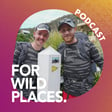Speaker
I think those things no one's doing like we're the only one that to my knowledge doing that. ah That's awesome and and I guess how can people get behind you? I mean obviously obviously buying shoes is is an obvious one and I guess sharing on social and that kind of stuff. Yeah but how can we help you out? Yeah it's just shoes but we also um we have you know trucker hats and shirts and they're all made you know we have recycled shirts that pre-consuming recycle bit. We have you know we have all sorts of other product too for people that haven't And we do like, I love, you know, Patagonia is a great brand and, you know, they are a brand that does funnel money into important, you know, organizations. And so um I would love to think that Tarkan can be more than just a running shoe company. You know, I'd love it to be a brand that people just, you know, they don't run just, great you know, wear the hat or wear the shirt or wear the, we've got some hoodies coming out next week and stuff like that, you know, and just getting behind us and, and supporting our brand and, you know, telling friends. And that's how things grow, you know, just word of mouth. Yeah, awesome. Anyone else got any questions or comments? um Have you been back to the Tarkon since Sam? I was down to run this year the Tarkon, but then we weren't allowed, I live in Fremantle in Western Australia and we weren't, I had to pull out like a week prior because our government still wasn't letting us, letting us leave the state at that point in time. That was in February, I think, February, early March, I can't remember a bit. I think it was late actually. And so, and then about two weeks later, they released the borders. So, I haven't been back since COVID, unfortunately, but I will be, I'm definitely going to run the race next year. And, and yeah, I'll be going back every, every year, as long as there's no more random pandemics that strike. Yeah. And as long as they continue to log the native forests of Tasmania. think Yeah. I don't think it's going to stop anytime soon, especially unless















